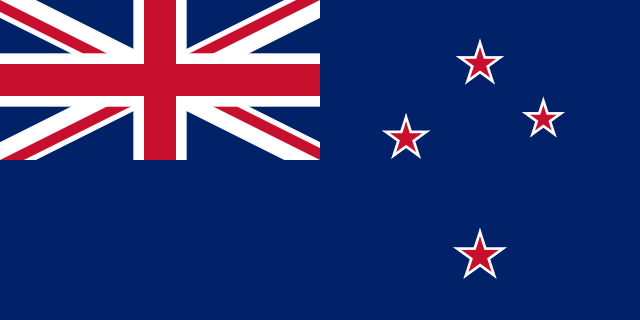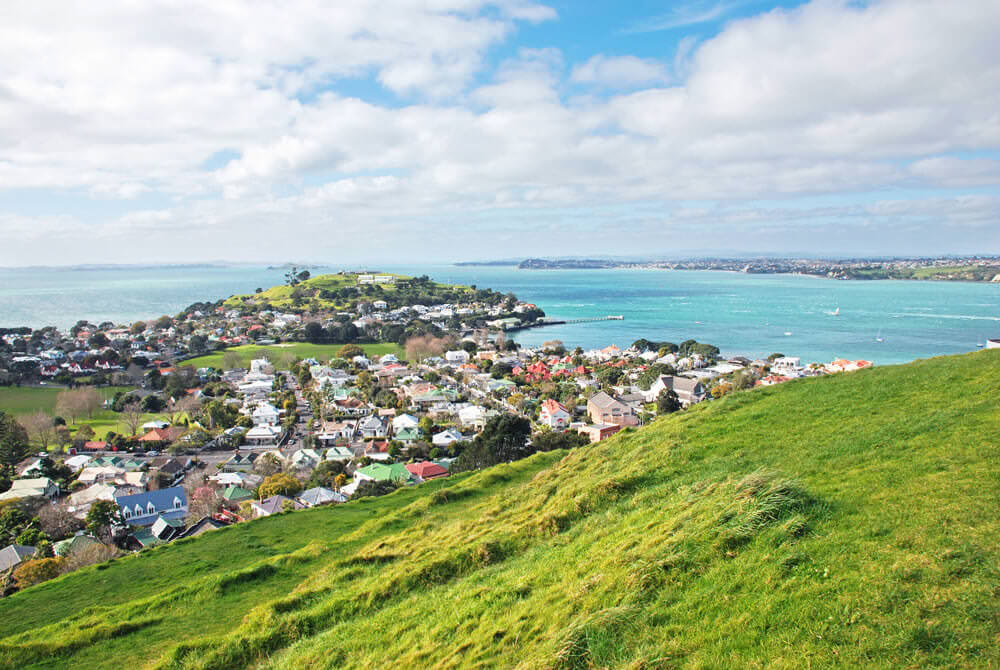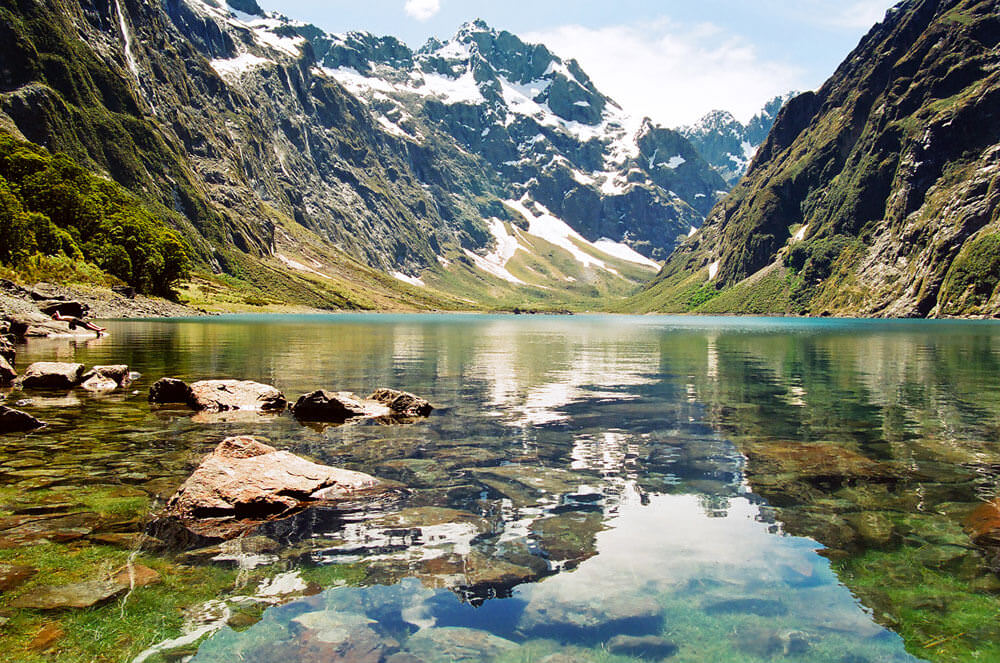New Zealand

Capital City: Wellington
Population: 5,122,600 (2022)
Land Area: 268,021 sqkm
Official Language: English, Māori, New Zealand Sign Language
Time Zone: GMT+13hr
Currency: New Zealand Dollar (NZD)
GDP: 248.9 billion USD (2021 est.)
Main industries: Agricultural export trade, business services, tourism
Principal exports: Milk and dairy products, meat, wood
New Zealand, or “Aotearoa” in Maori, is an island territory located in southwest Polynesia on the South Pacific Ocean, about 1600 km in length and 450 km in width, totalling a land area of 268,021 sqkm. It is divided into two main islands called the North Islands and the South Islands, along with 600 smaller islands. The largest city in New Zealand is Auckland, whilst Wellington is the capital, and both these cities are in the North Islands. Both the North and South Islands are separated roughly down the middle into two parts by mountain ranges. Additionally, New Zealand also administers the island group of South Pacific Tokelau and a section of the Antarctic while Niue and Cook Islands are self-governing territories that maintain voluntary association with the country.
New Zealand is a beautiful and scenic country that has a diverse landscape, ranging from the snow-capped Southern Alps, including the famous Mount Cook, glacier lakes and fjords, to active volcanoes, sandy beaches and green meadows and valleys. The country’s vegetation and animal habitats are as diverse as the landscape, with many rare species such as the kiwi, hector dolphin and short-tailed bat. The Tongariro National Park, Te Wahipounamu in the South Island, and the Sub Antarctic Islands are the three UNESCO World Heritage sites in New Zealand.
Demographics
New Zealand is home to almost 5.13 million people. Its latest census held in 2018 estimates that the main ethnic groups are European (70.2%), Māori (16.5%), Asian (15.1%), Pacific peoples (8.1%), and Middle Eastern/Latin American/African (1.5%). English, Māori, and New Zealand Sign Language are the official languages, out of which English is spoken the most (95%) in everyday lives. New Zealand is primarily an urban country, with almost 81.4% of the population living in cities. Major urban cities include Auckland, Christchurch, Wellington, and Hamilton. About one-fifth of the nation’s citizens are under the age of 15.
As at the 2018 census, 37% of the population identifies as Christians, with Hinduism (2.7%), Islam (1.3%) and Buddhism (1.1%) being the largest minority religions. Almost half of the population (48.5%) is irreligious.

History
The Polynesian ancestors of the Māori were the first to settle in modern-day New Zealand in the early 13th century. People of Māori still practice their ancient traditions and customs, such as the Pasifka in the present day, as Auckland hosts the world’s largest annual Polynesian festival.
In 1642, Dutch explorer Abel Tasman was the first European to discover the island. Dutch cartographers named the islands “Nieuw Zeeland” (after the Dutch province of Zeeland). The name was later anglicized to New Zealand during British exploration in the late 1760s. In the 1830s, the British settled in the country due to French competition for colonies. On 6 February 1840 at Waitangi, under the governorship of William Hobson, more than 500 Māori chiefs signed a treaty with the British crown, which signifies the start of British annexation. However, in the 1860s, increasing pressure from the British to surrender Māori lands on the Northern Island led to an all-out war between the Māori and the British. The war led to many European and Māori causalities, with the latter suffering greater losses. After the war, Māori Land was ‘confiscated’ by the British government under the New Zealand Settlements Act 1863. By 1870, the Māori rebellion was dominantly ended. In 1891, the liberal Prime Minister, John Balance, took office and implemented liberal rules. New Zealand became the world’s first country to enfranchise women in 1893. Nationalism also began to grow in the 1890s as the New Zealand Natives Association (NZNA) was formed.
National sentiment grew further during World War I as New Zealanders proved themselves as outstanding soldiers. After the war, New Zealand was admitted to the League of Nations and thus acquired the status of a sovereign state. New Zealand followed Canada and Australia in asserting its autonomy, especially over foreign relations issues at imperial conferences. Although the Statute of Westminster took effect in 1931, New Zealand only adopted it in 1947 due to its concerns over the principle of Commonwealth autonomy.
During World War II, New Zealand developed a defensive alliance with Australia and the United States, which provided forces in the Pacific region. New Zealand’s dependence on the British shrank. The then Prime Minister, Peter Fraser, insisted on an independent seat in the council of the Allied Powers and at the formation of the United Nations. As such, New Zealand declared independence in 1947 as it rejected being part of the Australian federation.
In the 1970s and 1980s, indigenous Māori people were politically and culturally active. In particular, they demanded the return of land and compensation since 1840 under the Treaty of Waitangi. In 1975, a tribunal was established to scrutinize their claims. In the 1990s and 2000s, monetary and land compensation were given to rectify previous injustices done to Māori. The electoral reform in 1993 changed the “first-past-the-post” system to a proportional representation system, thereby facilitating Māori representation in the government.
Key dates
1200-1300 Ancestors of Maori arrive to Polynesia and name the land Aotearoa
1642 Dutch explorer Abel Tasman discovers Neq Xealand
1815 Arrival of British missionaries
1840 Treaty of Māori signed and British annexation official begins
1863 New Zealand Settlements Act signed
1893 Women gain the right to vote
1907 New Zealand becomes dominion within British Empire
1947 New Zealand gains independence
1984 Prime Minister David Lange begins radical economic reforms
1985 New Zealand refuses to allow US nuclear-powered or nuclear-armed ships to enter its ports
1993 Electoral reform carried out
1998 Waitangi Tribunal orders confiscated land in Turangi Township to be returned to its Maori owners.
Legal System and Government
The government of New Zealand is a combination of a constitutional monarchy and a parliamentarian system. The head of the state is the King of the United Kingdom, as represented by the Governor-General in New Zealand. The head of government is the Prime Minister, who is elected every three years. New Zealand adopts the system of ‘responsible government,’ which means ministers are selected from elected members of the legislature. Coalition governments are formed in proportion to their votes. The parliament consists of the King and the unicameral House of Representatives, members of which are also elected every three years. There is no single written constitution in New Zealand. Instead, parliamentary legislations are of the highest authority.
The two major sources of law are statutes passed by the parliament and the common law inherited from English law. The Supreme Court is the highest and final court. The Court of Appeal is an appellate court below the Supreme Court and hears civil and criminal appeals. The High Court hears the more serious cases, while the District Court hears the less serious cases.
Economy
New Zealand has a robust and advanced economy, ranked first in the world for doing business with foreign nations and the 3rd freest economy in the world according to the 2020 Index of Economic Freedom. International trade accounts for around half of the country’s total economic activity, demonstrating the ease of commercial transactions in New Zealand.
The open and transparent economy provides a favourable environment for agricultural export trade, which New Zealand’s economy depends upon. The major agricultural products include milk, meat, forest products, fruits and vegetables, and wine. As such, New Zealand is the 12th largest agricultural exporter worldwide and the 2nd largest producer of dairy products. Besides agriculture, business services and tourism also support New Zealand’s economy substantially. In terms of GDP, primary industries such as agriculture, forestry, fishing and mining contribute an estimated 7 per cent while manufacturing, construction and utilities’ industries contribute 20 per cent. The services sector, which includes tourism, agricultural product services and trade, warehousing, real estate, financial services and transport amongst several other industries, provides two-thirds of the nation’s GDP revenue.
New Zealand has recovered from the pandemic with a 5.6% GDP growth in 2021. Although the supply chain disruption and increase in energy costs affected its economy, inflation has reduced significantly from 6.3% to 3.9% in 2022. Overall, New Zealand remains one of the most stable economies in the world.
Trade
New Zealand’s 2021 GDP is US$249.9 billion, an all-time high for the nation. Total exports for 2021 were US$77.2 billion, with the top commodities traded being dairy products, eggs, honey, edible products (28.5%), meat and edible meat offal (14.2%), wood and articles of wood, wood charcoal (8.9%) and edible fruits, nuts, peel of citrus fruit, melons (6.4%). The main export destinations for 2021 were China (32.5%), Australia (11.5%), the US (10.5%), Japan (5.9%), and South Korea (3.3%).
Imports for 2021 were approximated at US$85.4 billion. The nation’s top imports were cars (14.5%), machinery, nuclear reactors, boilers (14%), electrical, electronic equipment (8.8%), and mineral fuels, oils, distillation products (7.9%). New Zealand’s top import suppliers are identical to its top export destinations: China (23.7%), Australia (11.3%), the US (8.6%), Japan (6.4%), and South Korea (5.6%).
New Zealand is a signatory of the Regional Comprehensive Economic Partnership (RCEP), the Digital Economy Partnership Agreement (DEPA), the Pacific Agreement on Closer Economic Relations (PACER) Plus, the ASEAN-Australia-New Zealand free trade agreement (AANZFTA), the Trans-Pacific Strategic Economic Partnership (P4) and the Comprehensive and Progressive Agreement for Trans-Pacific Partnership (CPTPP). In terms of bilateral agreements, New Zealand has FTAs in force with Hong Kong, China, Malaysia and South Korea; FTAs that have reached a conclusion but have yet to be enforced include those with the UK and the EU. Aside from these, New Zealand has also signed the NZ-Australia Closer Economic Relations (CER), the NZ-Thailand Closer Economic Partnership (CEP) and the NZ-Singapore CEP.

Investment Opportunities
New Zealand’s tourism industry has been strong for decades, and it promotes tourism as a key industry: New Zealand spent a total of NZ$39.1 billion on tourism in 2018. The country is predicted to welcome 5.1 million visitors by 2025 and is set to have 25% more sustainable visitor experiences by the same year, making the country an attractive destination for foreign investment. New Zealand fosters a diverse landscape, which would allow for a range of business opportunities to be pursued within the sector.
The nation is seeking to diversify its economy further through advanced transport innovation. This ranges from space travel to zero-emission transport. In fact, New Zealand aims to have net-zero carbon emissions by 2050. Furthermore, private space research companies would benefit from the world’s first fully private orbital launch range and ideal location for rocket launching with a wide range of launch angles. Total revenue from the space sector in New Zealand was estimated to be NZ$1.75 billion in 2019. Due to its wealth of forest area, New Zealand enjoys strong forestry and wood processing industries. It is the first in the world for log exports, which generated revenue of more than NZ$3.5 billion in 2018. The country aims to develop this sector in a sustainable way so as to respect its goal of zero-carbon emissions by 2050. Investment in this sector would fund the industry to achieve such an aim.